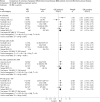A meta-analysis on the influence of inflammatory bowel disease on pregnancy
- PMID: 17185356
- PMCID: PMC1954859
- DOI: 10.1136/gut.2006.108324
A meta-analysis on the influence of inflammatory bowel disease on pregnancy
Abstract
Background: Inflammatory bowel disease (IBD) has a typical onset during the peak reproductive years. Evidence of the risk of adverse pregnancy outcomes in IBD is important for the management of pregnancy to assist in its management.
Aim: To provide a clear assessment of risk of adverse outcomes during pregnancy in women with IBD.
Design: The Medline literature was searched to identify studies reporting outcomes of pregnancy in patients with IBD. Random-effect meta-analysis was used to compare outcomes between women with IBD and normal controls.
Patients and setting: A total of 3907 patients with IBD (Crohn's disease 1952 (63%), ulcerative colitis 1113 (36%)) and 320 531 controls were reported in 12 studies that satisfied the inclusion criteria.
Results: For women with IBD, there was a 1.87-fold increase in incidence of prematurity (<37 weeks gestation; 95% CI 1.52 to 2.31; p<0.001) compared with controls. The incidence of low birth weight (<2500 g) was over twice that of normal controls (95% CI 1.38 to 3.19; p<0.001). Women with IBD were 1.5 times more likely to undergo caesarean section (95% CI 1.26 to 1.79; p<0.001), and the risk of congenital abnormalities was found to be 2.37-fold increased (95% CI 1.47 to 3.82; p<0.001).
Conclusion: The study has shown a higher incidence of adverse pregnancy outcomes in patients with IBD. Further studies are required to clarify which women are at higher risk, as this was not determined in the present study. This has an effect on the management of patients with IBD during pregnancy, who should be treated as a potentially high-risk group.
Conflict of interest statement
Competing interests: None.
References
-
- Binder V. Epidemiology of IBD during the twentieth century: an integrated view. Best Pract Res Clin Gastroenterol 200418463–479. - PubMed
-
- Banks B M, Korelitz B I, Zetzel L. The course of non‐specific ulcerative colitis: a review of twenty years experience and late results. Gastroenterology 195732983–1012. - PubMed
-
- Friedman S. Management of inflammatory bowel disease during pregnancy and nursing. Semin Gastrointest Dis 200112245–252. - PubMed
Publication types
MeSH terms
LinkOut - more resources
Full Text Sources
Medical



